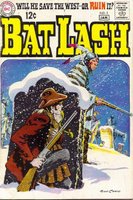Comics adaptations of movies are pointless cash-ins at best--movies that don't move with inaccurate drawings of the actors and scenery.Wolk talks about movies, but the same applies to TV shows, but even more so because we could see that the drawings didn't really capture the characters all that well on a weekly basis.
DC had a lot of licensed properties at the beginning of the Silver Age:
But the negative of comics based on TV shows (in addition to that mentioned above) is that the shows themselves get cancelled eventually, and so the tie-in becomes quite a bit less valuable (unless, of course, the show does well in syndication). Still, there's always a new show:
Comics based on movie stars proved longer lasting, particularly funny men:
The advantage here is obvious: these guys had much more staying power than your average TV show; Lewis' career in film was over 20 years long and Hope managed to stay atop theater marquees for even longer.
Some other DC licensed titles in the Silver Age included Sgt Bilko, Sgt Bilko's Private Doberman, Mr District Attorney and Jackie Gleason's the Honeymooners. They even licensed the right to publish a comic based on the first James Bond movie, Dr No:
Although oddly the book was actually originally published by Classics Illustrated in England and DC's sales were disappointing, probably because the comic was released several months before the movie hit the big screen in the USA.
For whatever reason, Marvel had almost no licensed properties during the Silver Age; I believe the lone exception is the Conan the Barbarian title which first appeared in 1970.
Of course, the kings of licensed properties in the Silver Age were Dell and Gold Key. The Four-Color line of comics, which I talked about awhile ago, consisted almost entirely of TV, movie and animation show tryouts. Here are the covers to fifteen issues of Four Color from late 1961 to early 1962:
Several animation favorites (Yogi Bear, Rocky & Bullwinkle, King Leonardo, Chilly Willy), some TV shows (Hennesey, Bonanza, Laramie, Leave it to Beaver and the Untouchables) and Walt Disney (Hans Brinker & the Silver Skates, Grandma Duck and Babes in Toyland). Dondi was a long-running comic strip about a war orphan adopted by soldiers.
Dell and Gold Key had a very long and profitable relationship with Walt Disney. Western Publishing licensed the Disney properties for comics and other publication, put together the comics, and then had Dell distribute them until 1962, when the two companies had a falling-out. Dell published hundreds of Disney comics during the 1940s and 1950s, including the famed Donald Duck series, which is one of the few examples of a licensed character being more successful and popular in the comics than he had been in his original medium.
After the split with Dell, Western published its own comics under the Gold Key imprint and continued its practice of licensing TV and movie properties, as well as developing a few of its own characters, like the excellent Magnus, Robot Fighter series I have covered extensively in the past. Some of the licensed projects have been pretty good; I covered Gold Key's adaptation of Secret Agent three years ago. On the other hand, there's this:
Run, Buddy, Run was a short-lived comedy about a guy on the run from the mob.














2 comments:
Another DC licensed property in the Silver Age -- fitting in with the season -- was Rudolph, the Red-Nosed Reindeer. Most years there was but a single issue, and in this case the comic creators had certain advantages. Since the original property was basically a song, there was no definitive look to the character... no supporting cast (except for Santa and "all of the other reindeer)... no storyline to adhere to. They could pretty much build up Rudolph just from a concept funny animal, with an endearing superpower.
DC's "Many Loves of Dobie Gillis" comic was eventually retooled into the liscense-free "Way-Out World of Windy and Willy", which were just reprints of the Dobie Gillis stories with the characters replaced (for example, Dobie Gillis himself became Willy Newton).
Post a Comment